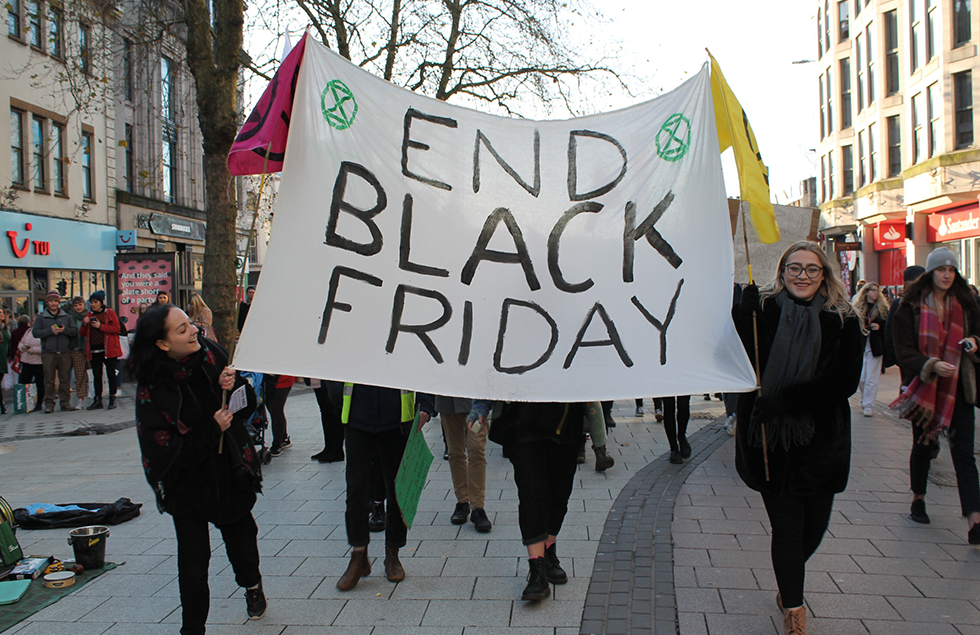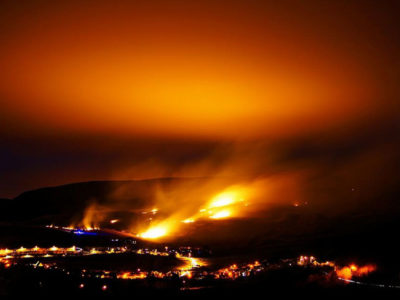The statistics behind throw-away culture
Black Friday sees retailers slash prices in a bid to increase sales, particularly high-street clothing chains. With the announcement of a climate emergency, we looked into the evidence to support an unsustainable garment industry and how continuing to buy into fashion consumerism contributes to global warming.
- The textile industry is the second most polluting industry after oil.
- Of all the textiles in landfills, 85% are products from the fashion industry.
- In 2016, the United Kingdom purchased 1.13m tonnes of clothing which generated a total of 26.2m tonnes of carbon dioxide. In the same year, the United Kingdom sent 235m items of clothing to landfill.
- Clothes can take up to 40 years to decompose in landfills due to fabric, dyes and chemicals.
- According to Clothes Aid, the largest clothes collection company, the United Kingdom send 700,000 tonnes of clothing to recycling centres, textile banks, clothes collections and to charity each year – enough to fill 459 Olympic-size swimming pools.
What do you think of the climate change protest against Black Friday?
We spoke to passersby’s in the St David’s Shopping Centre about the Black Friday protests. Here’s what they had to say.
Aziz Ashman, 31
“I think climate change is a really important issue, the temperature is rising really high because of this, especially in the Middle East where I am from, we have temperatures that go over 50 degrees. I think Black Friday is a bad thing for the environment and protests like this are good, but I am just wondering how effective they are…”
Anonymous
“I think we should end Black Friday because I think it’s really bad for climate change and also why should we bring an American thing here?”
Anonymous
“I think just lying on the ground isn’t gonna stop climate change or Black Friday, I just think it’s just a bit of attention-seeking, to be honest.”
Mira Ahmad, 30
“I don’t think it will make much impact because it’s only a small thing.”
How to save the earth with five minutes a day of responsible consumerism
Although the planet is in a state of climate emergency, all is not lost. Groups like Extinction Rebellion are uniting to demand policy change and there are still things that we can do at home to help solve the problem. This video shows how to save the earth with five minutes a day of responsible consumerism.
City-wide protests demanded an end to Black Friday as state of planetary emergency is declared by European Parliament and leading climate change experts
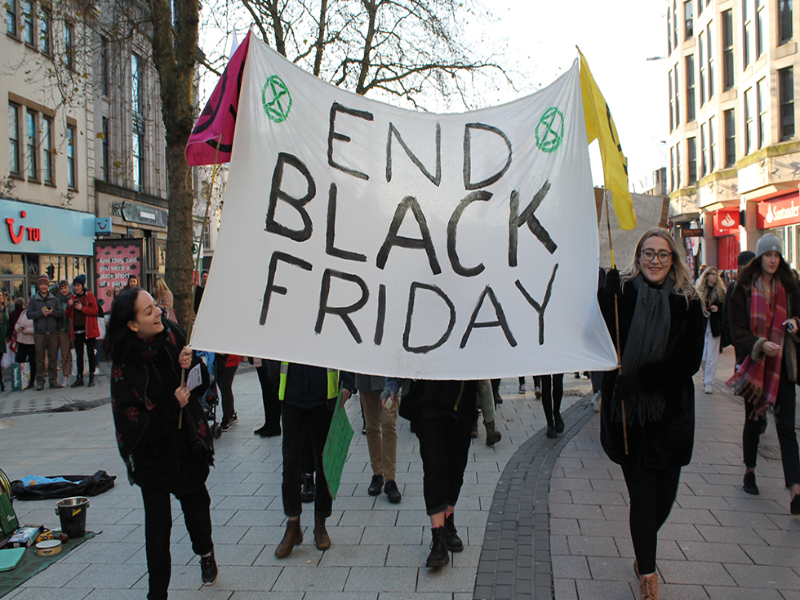
On 28 November 2019, the European Parliament announced that the earth is in a state of climate emergency.
The parliament declared a global climate and environmental crisis, urging all EU countries to commit to zero greenhouse gas emissions by 2050. They believe it is essential to reduce all carbon emissions by 55% by 2030.
The vote was passed following warnings from climate scientists that the earth had potentially already crossed a series of tipping points. This is when the effects of global warming become irreversible.
In the wake of this news, Extinction Rebellion Students Cardiff marched in the city against Black Friday, protesting consumerism, fast-fashion and the devastating impact that the production, transportation and distribution of discounted purchases have on the health of the planet.
Dozens of climate protesters took to the streets of Cardiff, marching from the statue of Aneurin Bevan on Queen Street to the St David’s Shopping Centre where they held a ‘die-in’ – a form of protest in which participants simulate being dead – on the second floor among shoppers.
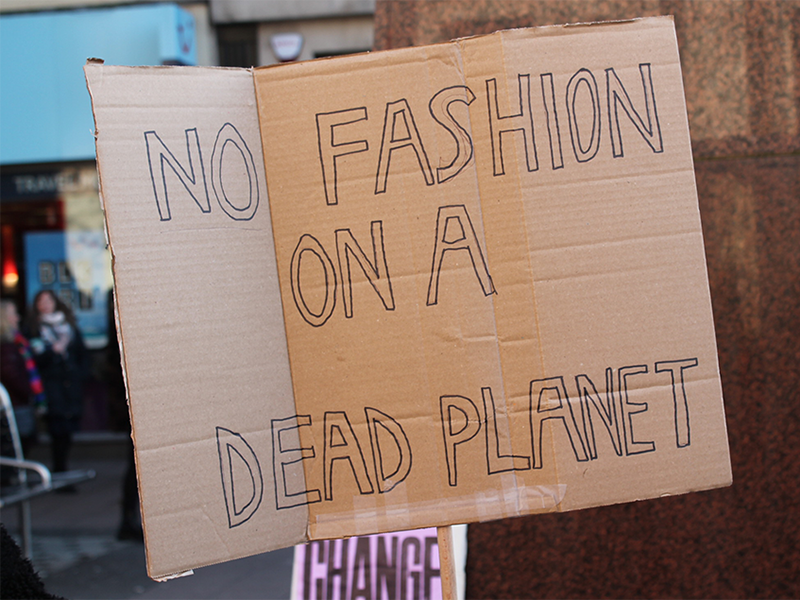
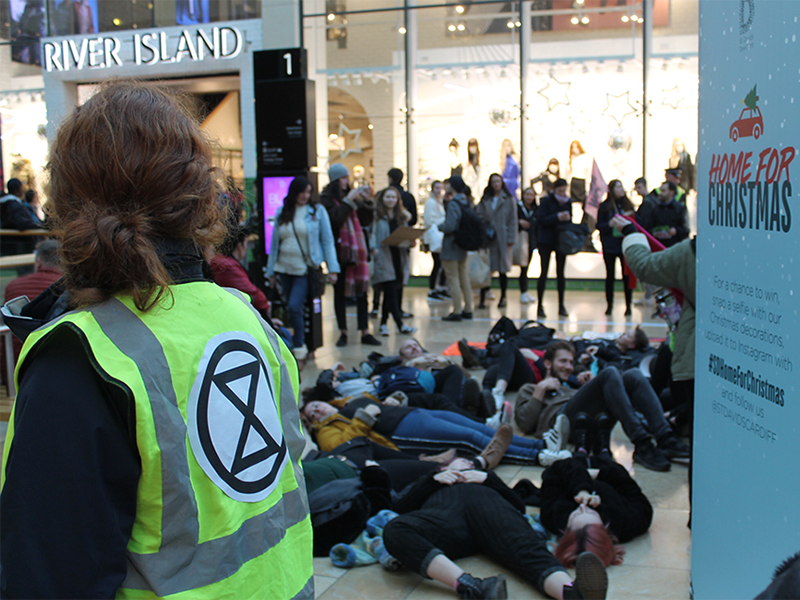
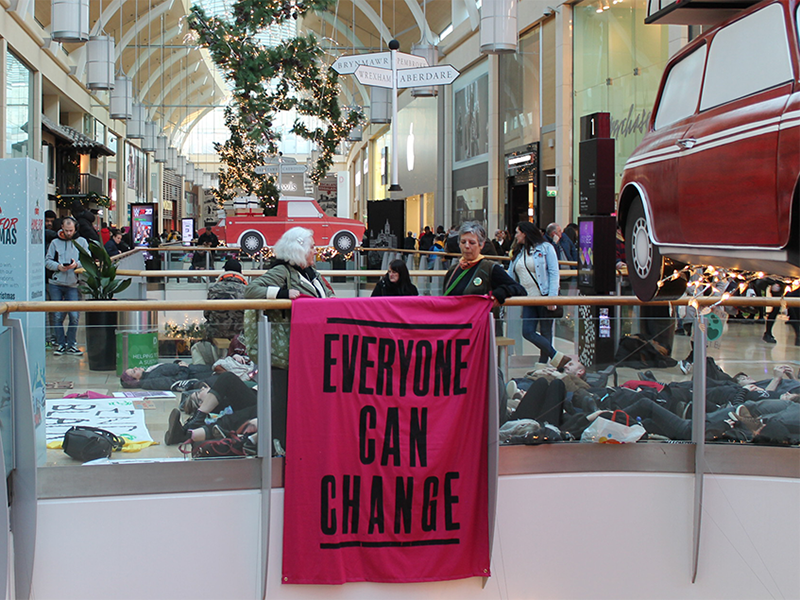
“It’s mainly about mass consumption, not necessarily about Black Friday, but the idea itself is just another way of unhealthily encouraging people to shop,” said Matt Tomlin, protest organiser and leader of Extinction Rebellion Students Cardiff, “This is really detrimental for the environment and the biosphere, Black Friday didn’t exist until about five years, we don’t need it.”
Indeed, in the United Kingdom, fast-fashion is a leading cause of climate change with 300,000 tonnes of textiles finding their way to landfills each year. Annually, this is £140m worth of clothing. Protest groups like Extinction Rebellion say Black Friday is the busiest shopping day of the year as retailers slash prices in a bid to increase pre-Christmas sales, encouraging a harmful, throw-away culture.
Live at the die-in being held in the St David's Centre. Extinction Rebellion is protesting against the harmful effects of consumerism made worse by Black Friday. #planetnotprofit Cardiff Extinction Rebellion Caerdydd
Posted by AltCardiff on Friday, 29 November 2019
Live at the Cardiff Extinction Rebellion Caerdydd Black Friday protests in the St David's Centre. #planetnotprofit
Posted by AltCardiff on Friday, 29 November 2019
One protester, who asked to remain anonymous at last week’s demonstration, said, “We need to stop buying into consumerism before we f**k up the planet for good.”
Fraser Bolitho, a member of the Extinction Rebellion Students Cardiff said, “A lot of people don’t realise that 10% of the greenhouse gas emissions come from the fast fashion industry and this is why we are here today, to bring their attention to this issue.”
Earlier in the day, the group also held a Green Friday Rebel Market at The Hayes to provide an escape from the consumerist frenzy. This event was the latest in a series of demonstrations that Extinction Rebellion has staged in Cardiff. A mass climate strike was held in September and the group previously blocked a main road in the city centre for three days, protesting the lack of government action regarding the climate crisis.
To keep up with Extinction Rebellion Students Cardiff, find them on Facebook and Twitter where they regularly share details upcoming events.
The statistics behind throw-away culture
Black Friday sees retailers slash prices in a bid to increase sales, particularly high-street clothing chains. With the announcement of a climate emergency, we looked into the evidence to support an unsustainable garment industry and how continuing to buy into fashion consumerism contributes to global warming.
- The textile industry is the second most polluting industry after oil.
- Of all the textiles in landfills, 85% are products from the fashion industry.
- In 2016, the United Kingdom purchased 1.13m tonnes of clothing which generated a total of 26.2m tonnes of carbon dioxide. In the same year, the United Kingdom sent 235m items of clothing to landfill.
- Clothes can take up to 40 years to decompose in landfills due to fabric, dyes and chemicals.
- According to Clothes Aid, the largest clothes collection company, the United Kingdom send 700,000 tonnes of clothing to recycling centres, textile banks, clothes collections and to charity each year – enough to fill 459 Olympic-size swimming pools.
What do you think of the climate change protest against Black Friday?
We spoke to passersby’s in the St David’s Shopping Centre about the Black Friday protests. Here’s what they had to say.
Aziz Ashman, 31
“I think climate change is a really important issue, the temperature is rising really high because of this, especially in the Middle East where I am from, we have temperatures that go over 50 degrees. I think Black Friday is a bad thing for the environment and protests like this are good, but I am just wondering how effective they are…”
Anonymous
“I think we should end Black Friday because I think it’s really bad for climate change and also why should we bring an American thing here?”
Anonymous
“I think just lying on the ground isn’t gonna stop climate change or Black Friday, I just think it’s just a bit of attention-seeking, to be honest.”
Mira Ahmad, 30
“I don’t think it will make much impact because it’s only a small thing.”
How to save the earth with five minutes a day of responsible consumerism
Although the planet is in a state of climate emergency, all is not lost. Groups like Extinction Rebellion are uniting to demand policy change and there are still things that we can do at home to help solve the problem. This video shows how to save the earth with five minutes a day of responsible consumerism.

